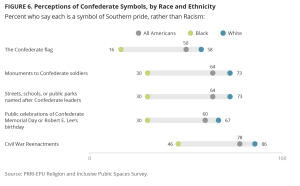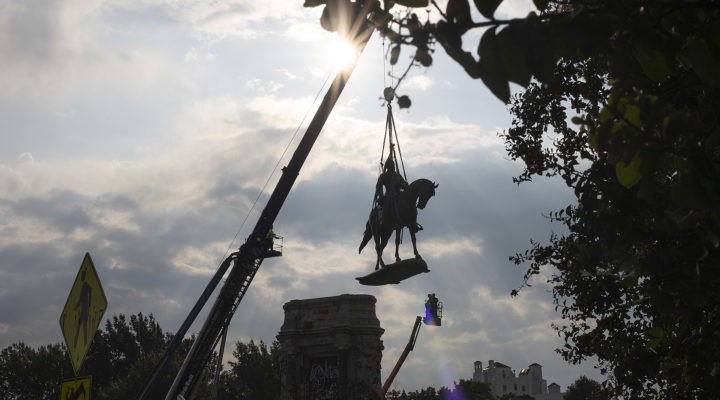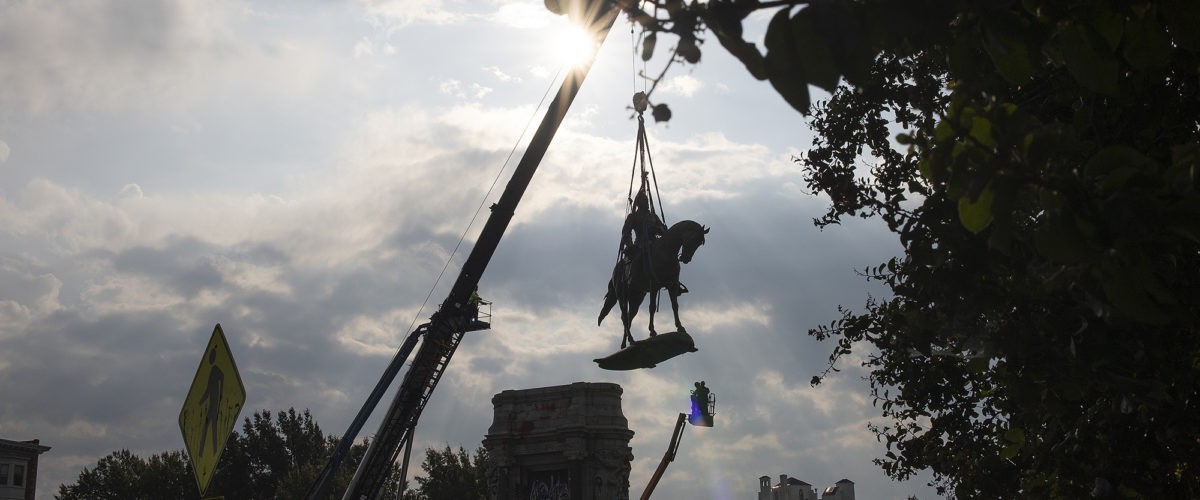It’s no news flash that the presence — or sudden absence — of memorials to the Confederacy is a symbol of America’s divided politics today. Yet a new national study by Public Religion Research Institute puts some hard numbers on the actual beliefs of Americans about what should be cast in stone.
A slim majority of Americans (51%) support preserving Confederate history using memorials and statues, while 46% are opposed.
This desire to preserve monuments to the Confederacy and Confederate leaders enjoys overwhelming support among Republicans (85%), compared with less than half of independents (46%) and only one in four Democrats (26%).
And as PRRI reported, “the contrast between white Republicans and white Democrats is stark.”
Nearly nine in 10 white Republicans (87%), compared with 23% of white Democrats, support efforts to preserve the legacy of the Confederacy. Just a quarter of Black Americans (23%) agree.

The statues and memorials that have been at the heart of national, state and local protests over the last three years were erected not immediately after the Civil War but from 1890 to the 1950s, paralleling the era of Jim Crow segregation. Supporters of the monuments say they are important historical markers, while critics of the monuments say they were erected to further segregation and the Lost Cause narrative of the Civil War.
The Lost Cause is a way of glossing over the fact that Confederate leaders, soldiers and sympathizers were traitors to the United States who lost their insurrection. The Lost Cause seeks to hold up Confederates as noble leaders worthy of emulation.
That’s a story that has played better in the South than the North but that has come under intense scrutiny, especially since the murder of George Floyd and a summer of racial reckoning in 2020 that coincided with then-President Donald Trump fanning the flames of conservative resentment.
Faced with a new awareness of the nation’s racial realities amid a global pandemic that left most people at home watching more TV and reading more news, Confederate monuments and memorials became a key target of demonstrations. The presence of these monuments had been protested for years, but the drumbeat rapidly accelerated beginning in 2020.
This was true from small towns to big cities nationwide, but nowhere more visible than Richmond, Va., where an entire boulevard had been dedicated to a series of enormous statues of Confederate leaders.

After the crowds had left, a man reflects on the remnant of the Robert E. Lee statue in Richmond. (Photo by Warren F. Johnson)
Richmond’s Monument Avenue became ground zero for the fight over whether monuments should go or stay. The disagreement spilled over into churches, again exemplified in Richmond, where the historic First Baptist Church sits on Monument Avenue and one of the key Confederate statues stood on the adjacent intersection. When that monument was taken down, church leaders tolled the bells in the church tower, an act applauded by some and condemned by others even within the congregation.
The new PRRI data confirm that religious beliefs are a strong indicator of beliefs about the monuments.
White evangelical Protestants are the most likely (76%) to support preserving the history of the Confederacy with memorials and statues. Majorities of white mainline Protestants (65%), Latter-day Saints (65%), Hispanic Catholics (63%) and white Catholics (60%) agree.
Surprisingly, almost half of other Protestants of color (49%) support preserving the monuments. However, Black Protestants are the least likely (29%) to support the memorials.
It’s not just the large statues and monuments that preserve the history of the Confederacy and the Lost Cause. The Confederate flag remains highly controversial — seen by many white Southerners as a source of cultural pride but seen by others as a battle flag for racism and slavery. And then there are streets, parks, schools, government buildings and all manner of things named for Confederate leaders.
PRRI asked Americans their views on all these things. Here’s what they found:
- 50% of Americans see the Confederate flag primarily as a symbol of Southern pride, while 47% see it mostly as a symbol of racism. PRRI says this division has remained relatively steady since 2015.
- 83% of Republicans see the flag as a symbol of Southern pride, compared with 48% of independents and only 25% of Democrats. Republicans are more than three times more likely to take pride in the Confederate flag than Democrats.
- Support for the Confederate flag as a symbol of Southern pride is most prevalent among white Americans (58%), compared with 48% of Hispanic Americans (48%), 43% of multiracial Americans, 35% of Asians Americans and Pacific Islanders and just 16% of Black Americans. White Americans are more than three times more likely to take pride in the Confederate flag than Black Americans.
- Only 6% of Americans say they have flown or displayed a Confederate flag in the past year.
- 64% of Americans see streets, schools or public parks named for Confederate leaders as expressions of Southern pride rather than as expressions of racism.
- This view is especially strong among Republicans (92%), at rates more than double the share of Democrats (43%) who share that view.
- 21% of Americans agree with the statement, “I feel a special sense of pride when I see statues or monuments that honor Confederate leaders or soldiers,” while 75% disagree.
- Republicans (38%) are more than twice as likely as Democrats (14%) to say Confederate monuments make them feel proud.
Related articles:
Of statues and stories: Reckoning with the Lost Cause | Opinion by Greg Garrett
A tale of two cities: Telling the truth about race | Opinion by Greg Garrett
Tearing down statues doesn’t erase history | Opinion by Ella Wall Prichard
At the intersection of Monument(s) and Avenue(s), a new vision rises | Analysis by Craig Martin


